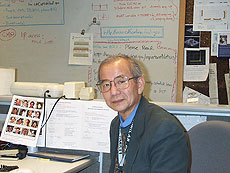In Memoriam: Kuni Kondo
 |
|
Kuni Kondo
|
Professor Kuni Kondo, an innovator and leader in particle physics, passed away unexpectedly on May 12 in Tokyo after a brief illness. He was 76.
Professor Kondo began his career as a research associate at the University of Tokyo in 1962 after receiving his Ph.D. in physics. He continued his career at Yale University where he worked with an international particle physics collaboration while using particle beam accelerators. He worked as an assistant and then a full professor at the University of Tokyo and eventually retired from the University of Tsukuba. He continued his study in high-energy physics at Waseda University after his retirement.
Throughout his career, Kondo worked on high-energy physics experiments at BNL, SLAC and most recently at Fermilab. He spent the last 31 years of his career on CDF.
The establishment of CDF as an international collaboration in 1980 was one in a series of US-Japan cooperative science and technology projects. In 1981, 15 scientists from Japan led by Kondo began participating in CDF, which had only 87 collaboration members. Professor Kondo led the group in completion of the design and construction of superconducting solenoid magnet, electromagnetic calorimeter, inner tracking chamber and muon chamber. He contributed to forming a strong Japanese group within the CDF collaboration. The group now has more than 35 members from four institutions.
During his time on CDF, Kondo was integral in the top quark discovery, and in 1998 was awarded with Nishina Memorial Prize recognizing his contributions to the top quark discovery. The Nishina Memorial Prize is one of the most prestigious awards in Japan.
Professor Kondo was an innovator in our field. He proposed a new analysis method to improve the precision of top quark mass. That method is now commonly applied to all different types of physics analyses at the Tevatron and commonly referred to as the matrix element method.
We remember Professor Kondo for his ever-present smile and quiet demeanor. He was also a constant mentor who advised 33 graduate students on their theses. As recently as this winter he advised students and helped with the day-to-day work of the CDF experiment. He held a deep passion for particle physics and for Fermilab until his final moment and his devotion to the mission and mystery of the field never faded.
He will be dearly missed by the CDF experiment and all who had the good fortune to know him.
— Robert Roser, CDF co-spokesperson
|